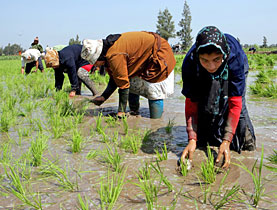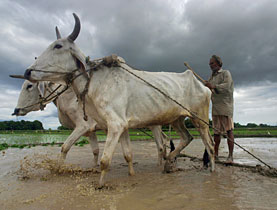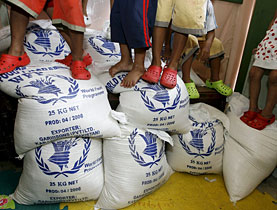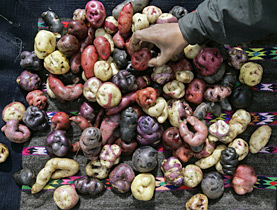Food summit to serve up old recipes warns NGO

As the United Nations world food summit takes place in Rome, observers are questioning whether it will lead to the radical changes needed to tackle the crisis.
The three-day conference, which ends on Thursday, is trying to find short-term solutions to spiralling food prices as well as a more lasting strategy to deal with causes.
The UN Food and Agriculture Organisation called the emergency meeting as soaring commodity prices threaten to add as many as 100 million more people to the 850 million already going hungry.
The cost of major food commodities has doubled over the past couple of years, with rice, corn and wheat at record highs.
The draft declaration being discussed by world leaders and experts for release on Thursday calls for a reduction in trade barriers and food export restrictions, emergency food aid, increased crop yields and guidelines on the use of biofuels.
UN secretary-general Ban Ki-moon felt the summit was already a success.
“There is a clear sense of resolve, shared responsibility and political commitment among member states to making the right policy choices and investing in agriculture in the years to come,” he told reporters.
But Tina Goethe of NGO Swissaid, which is part of the Swiss delegation in Rome, was not very happy with the way discussions were going.
“This summit demands radical changes but the countries come with the same ideas that have been talked about over the past 20 years,” she told swissinfo, adding that causal factors such as biofuels and speculative trading in agricultural commodities were not being properly dealt with, if at all.
Complex package
Experts say the crisis will require a complex package of policy responses over the short to long term.
“The first short-term priority should be to secure sufficient and efficient emergency food aid to assist the most vulnerable and the poor… in such a way that it doesn’t distort local markets,” Manfred Bötsch, director of the Federal Agriculture Office and head of the Swiss delegation in Rome, told journalists on Wednesday.
The UN World Food Programme announced the same day it was rolling out an additional $1.2 billion (SFr1.25 billion) in food assistance to help tens of millions of people in more than 60 nations hardest hit by the food crisis.
Much of the talk in Rome has also been about investing donor money into agriculture, especially in Africa.
In 1986 20 per cent of foreign aid spent by rich countries was devoted to agriculture in the developing world. By 2006, that share had fallen to less than three per cent.
“Everyone agrees that we have to invest more in agriculture as part of the solution,” Bötsch told swissinfo. “Special emphasis should be given to family farmers who have the greatest potential in terms of production growth.”
Goethe agreed that small-scale farming had to be at the centre of the response. She underlined the importance of a recent report by the International Assessment of Agricultural Science and Technology for Development.
The report recommends a fundamental rethink of agricultural knowledge, science and technology to achieve a sustainable global food system. “There are solutions out there, but it’s all about politics and power,” added Goethe.
Biofuels and trade restrictions
Diplomats suggest that biofuels and trade restrictions remain two of the most divisive issues to be discussed before Thursday.
Jacques Diouf, director-general of the FAO told heads of state on Tuesday that “nobody” understood why cereals had been diverted from human consumption “mostly to satisfy a thirst for fuel vehicles”.
Switzerland supports research into second-generation biofuels made from agricultural waste or from non-agricultural plants.
“But most countries agree that we have to establish guidelines to control biofuel production so they don’t harm the environment or society,” pointed out Bötsch.
There was wider consensus on the need to reduce trade barriers and scrap export bans imposed by some countries in an attempt to safeguard domestic food supply during the crisis.
Bötsch said there had been “full agreement that export food subsidies had to be eliminated”.
The Rome summit will set the tone on food aid and subsidies for the G8 summit in Japan in July and what is hoped to be the concluding stages of the stalled Doha talks under the World Trade Organisation aimed at reducing trade distortions.
swissinfo, Simon Bradley
In the year since 2007 wheat prices have gone up by 130%, soybeans by 87% and corn by 31%, according to the Bloomberg news agency.
The UN Food and Agricultural Organization says rice has gone up by 70% in the past year.
Some countries – including India, China, Vietnam and Egypt – have banned the export of rice.
1,000 – 2,000 litres of water is needed to produce 1kg of wheat
10,000 – 13,000 litres of water is needed to produce 1kg of beef.
The world population has grown from 2.5 billion in 1950 to 6.1 billion in 2000 and is projected to reach 9.2 billion by 2050.
There have been food riots and protests in Burkina Faso, Cameroon, Egypt, Ethiopia, Haiti, Indonesia, Ivory Coast, Niger and the Philippines.
The UN says as much as US$20 billion may be needed each year to increase food production to combat hunger.
Four years ago $10-15 billion was invested in agricultural commodities funds – now that figure is more than $150 billion.

In compliance with the JTI standards
More: SWI swissinfo.ch certified by the Journalism Trust Initiative




You can find an overview of ongoing debates with our journalists here. Please join us!
If you want to start a conversation about a topic raised in this article or want to report factual errors, email us at english@swissinfo.ch.